Images from the World Athletics Championships in Eugene, Oregon, on Thursday, Day 7.
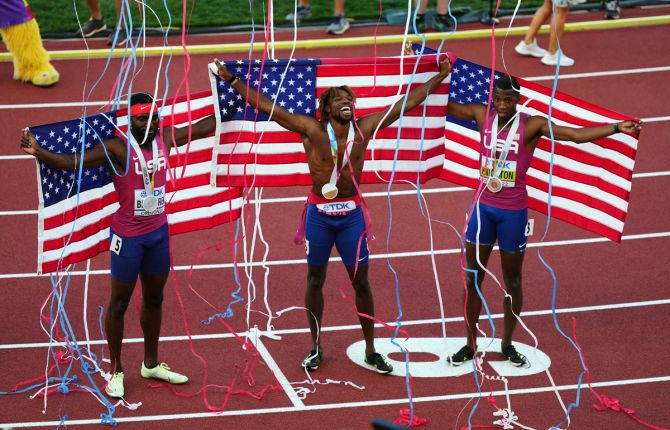
Noah Lyles produced a dominating performance to retain his 200 metres title in 19.31 seconds at the World Championships on Thursday, becoming the third-fastest athlete of all time over the distance and leading a second American sprint podium sweep.
Tokyo bronze medallist Lyles led at the halfway point and exploded through the finish, with compatriots Kenny Bednarek (19.77) and 18-year-old Erriyon Knighton (19.80) battling out of the turn and down the straight for silver and bronze.
Lyles ripped open his shirt after the finish as the home crowd in Eugene, Oregon, roared with approval, and offered an embrace to rival Knighton.
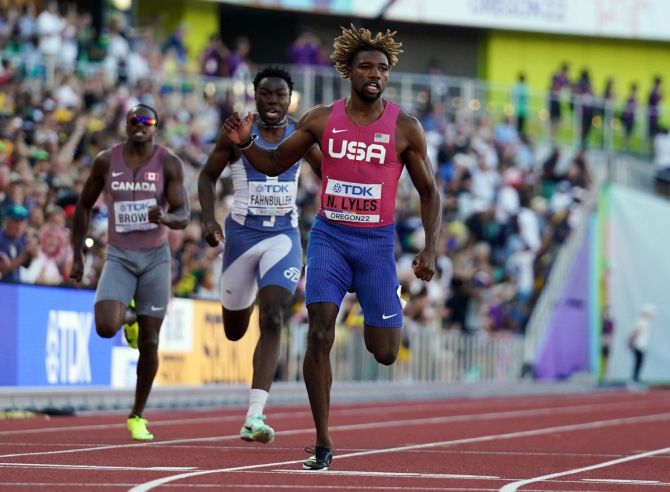
"Today is my day - I finally got to do what I dreamed of," he said on track after breaking four-time Olympic champion Michael Johnson's national record, which had stood since 1996. "I got my whole family here."
Lyles' time was initially displayed as 19.32, which would have tied Johnson's record. However, it was then updated to an official 19.31 when his back was turned, with the 25-year-old clearly stunned when he noticed the new figure on the clock.
Lyles hopped on the back of World Championships mascot Legend and rode across the track after the podium ceremony inside Hayward Field to the delight of the fans.
Thursday's race was the second 1-2-3 for U.S. men in Eugene after Fred Kerley, Marvin Bracy and Trayvon Bromell swept the 100m. It is the first time any country has swept the two men's sprints in the same year at the worlds.
Jackson wins women's 200m with stunning Championships record
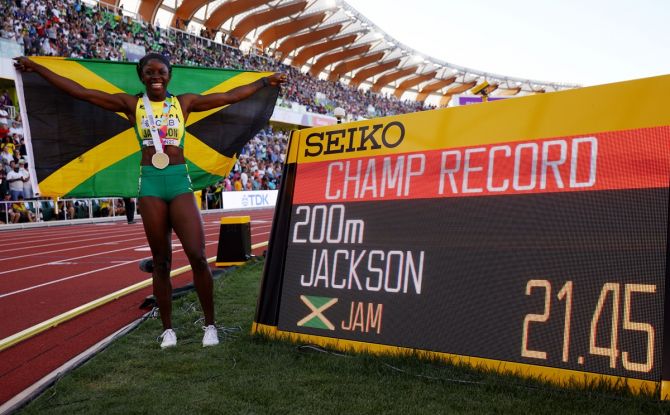
Jamaica's Shericka Jackson became the fastest woman alive over 200 metres on Thursday when she scorched to a brilliant world title in 21.45 seconds, a time bettered only by American Florence Griffith-Joyner in 1988.
Fellow Jamaican Shelly-Ann Fraser-Pryce, who claimed her fifth world 100m gold on Sunday, took silver in 21.81, with Britain's defending champion Dina Asher-Smith third in 22.02.
It was an incredible run by Jackson, edging her ahead of double Olympic sprint champion Elaine Thompson-Herah in the all-time list and closing in on Griffith-Joyner's 21.34 from the Seoul Olympics.
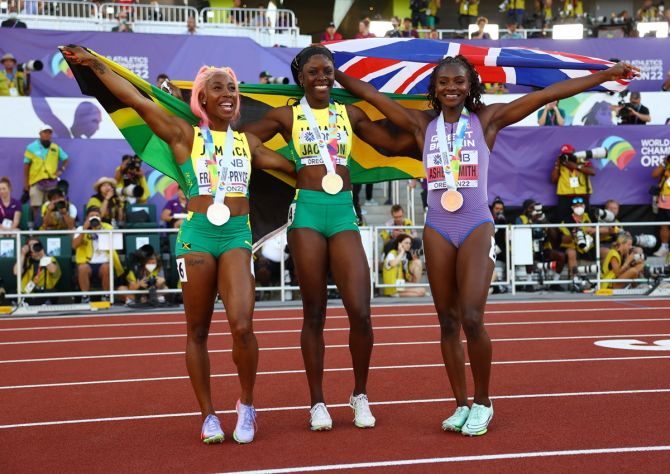
It also gave her a measure of satisfaction after her painful experience in the Tokyo Olympics when she eased up too early in the 200m heats and failed to go through when highly fancied for a medal.
Fraser-Pryce, who won the world 200 title in 2013, got her usual blistering start and the 35-year-old led coming off the bend before Jackson hit full stride and pulled clear to drive home.
“They pushed me and I'm so grateful - a championship record, a personal best," said Jackson, 28, who has a bagful of individual minor medals, including a silver in the 100m in Eugene last weekend.
Aminatou Seyni was fourth for Niger, ahead of American duo Abby Steiner and Tamara Clark, with Thompson-Herah seventh.
Olympic champion Korir leads trio of Kenyans into 800m final
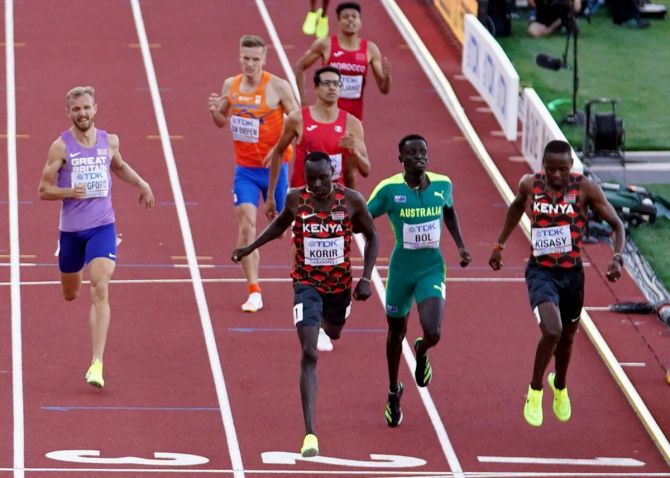
Kenya's Olympic champion Emmanuel Korir produced his best performance of the season to win his 800 metres semi-final on Thursday, while Algerian Slimane Moula came from behind to win his race in the fastest time of the day.
Korir, one of three Kenyans to advance to Saturday's final in Eugene, Oregon, took it easy to move through his opening heat but took a more aggressive approach in the semi-final.
Nearly half a second behind the leader with 100m left, he sprinted ahead of compatriot Wyclife Kisasy and Australian Peter Bol down the final straight, sneaking across the finish line in 1:45.38. Kisasy took the other automatic qualifying spot as Bol also advanced.
Moula (1:44.89) found a final burst of energy to streak past Canadian Marco Arop down the final straight of his heat, as 17-year-old Kenyan Emmanuel Wanyonyi advanced as a fast loser with a third-place finish.
Kenyan world indoor silver medallist Noah Kibet lost his speed out of the final turn as Algerian Djamel Sedjati and Frenchman Gabriel Tual came from behind down the final 100 metres for automatic qualification in their race.
The event was without Britain's Max Burgin, the fastest man in the world headed into Eugene and a real medal hope, after he pulled out with injury on Wednesday.
Mu leads US trio into women's 800 semis
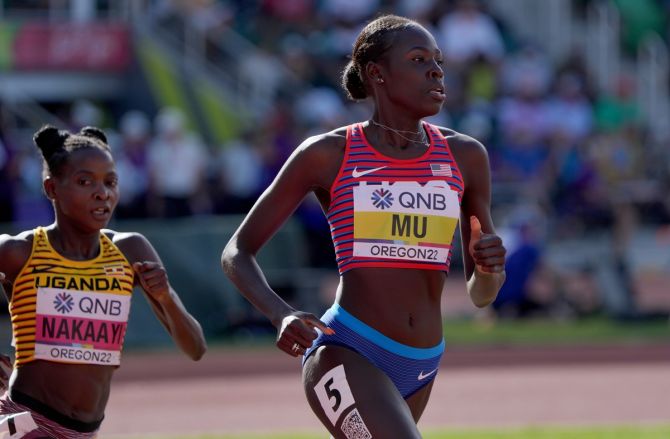
In a World Championships already boasting some notable clean sweeps, the United States remained in the hunt for a first 1-2-3 in the women's 800 metres after their big three, led by Olympic champion Athing Mu, advanced from Thursday's heats.
Mu, Raevyn Rogers and Ajee Wilson all looked good, while Kenya's Mary Moraa and Tokyo Olympic silver medallist Keely Hodgkinson of Britain, the only other athletes to have gone under 1:58s this season, also went through on a warm, humid night.
Mu, 20, has enjoyed a stellar first half of the season, albeit with her best time two seconds down on her 1:55.04 seconds personal best set on the same Hayward Field track almost a year ago.
"The focus coming here was just to be consistent," she said. "I think the main goal is definitely to get gold because we are here on the U.S. soil and who deserves more gold?
"Tactically if I feel that it is better for me to go to the front, I'll do that. If it is not, I will just stick back. It will depend on only how I am feeling."
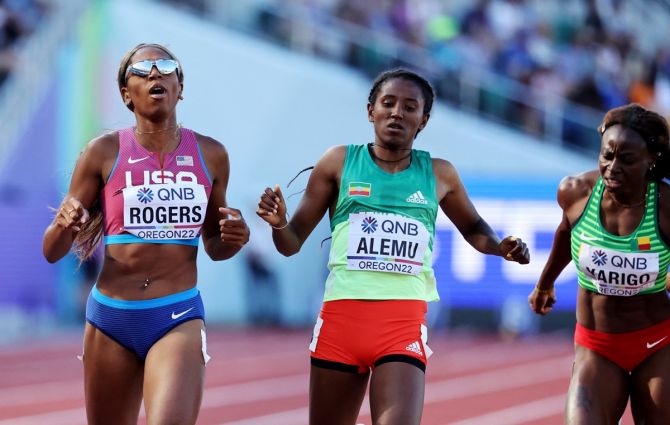
Rogers, who has a World silver and Olympic bronze to her name, left things a little late before a surge secured her place, while Wilson, third in the last two World Championships, looked assured.
Defending champion Halimah Nakaayi of Uganda also went through, second behind Mu in a slowly-run heat, while Ethiopia's Diribe Welteji was the fastest of the qualifiers in 1:58.83.
The semi-finals are on Friday with the final on the last night of action on Sunday.
The 800m is an event right at the heart of the debate over athletes of differences of sexual development (DSD), with many of its best performers of the last decade, including multiple World and Olympic champion Caster Semenya, now not allowed to run.
Their increased testosterone levels means they cannot compete in anything from 400m to a mile unless they take hormone suppression medication.
The all-time list is also skewed by the presence of DSD athletes and as well as several from former Eastern Bloc countries with dark doping histories, with the world record dating back to 1983.













 © 2025
© 2025